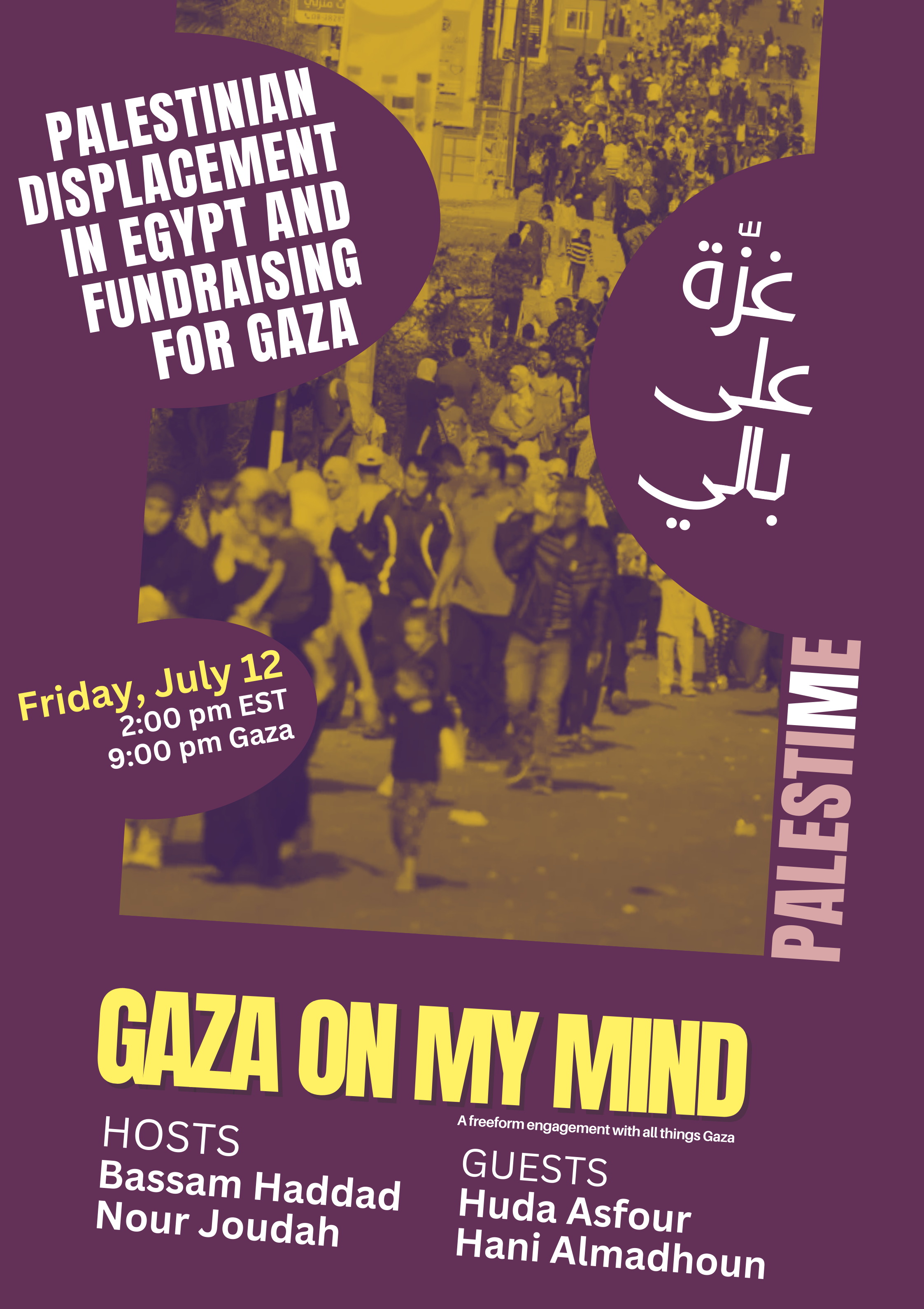Gaza On My Mind
غزّة علي بالي
Palestinian Displacement in Egypt and Fundraising for Gaza
Diary of a Palestinian from Gaza
Featuring:
Huda Asfour
Hani Almadhoun
Hosts:
Bassam Haddad
Nour Joudah
Friday, 12 July 2024
2:00PM EST | 9:00 PM Beirut | 9:00 PM Gaza
In this 9th episode of Gaza on My Mind / غزّة على بالي we address Palestinian displacement in Egypt with Huda Asfour as well as fundraising for Gaza generally with Director of UNRWA-USA Hani Almadhoun, who hails from Gaza. We will be fundraising directly to UNRWAUSA.org. Currently, more than 115,000 Palestinians have been displaced to Egypt since October 2023. Join us tomorrow/Friday with hosts @4bassam and @nsdoud. Friday, 2 PM EST, 9 PM Gaza, Live here on X.com/Jadaliyya and Youtube.com/@Jadaliyya/Streams.

Featuring
Huda Asfour is a firm believer in transcending boundaries, evident in her roles as a musician and educator. Her musical journey began early in conservatories in Tunisia and Palestine, culminating in collaborations worldwide. With two studio albums, "Mars... Back and Forth" (2011) and "Kouni" (2018), to her credit, Huda has also composed music for film and multimedia projects, and has collaborated and featured with musicians internationally. Currently, she's delving into the art of improvisation, with a keen focus on the intricate nuances of Arabic musical aesthetics and its interplay with language. In addition to her musical pursuits, Huda holds a B.Sc and a PhD in Electrical Engineering from George Washington University and is a co-founder of several initiatives such as the DC Palestinian Film and Arts Festival, and the Cairo and Brooklyn improv orchestras. Explore her work at hudaasfour.com.
Hani Almadhoun is UNRWA USA's Director of Philanthropy. Born in the Emirates, Hani's family fled to the Gaza Strip in the aftermath of the first Gulf War. It was tough adjusting to the harsh conditions in Gaza during the First Intifada, but his family was made whole again when his dad got a job at an UNRWA school teaching English to refugees. A child of an educator, Hani was raised with the mantra of school being the top priority, and in this pursuit, he eventually found his way to the United States, thanks to a university scholarship from the LDS Church. After earning both his Masters in Public Administration and his BA in International Studies and Latin American studies from Brigham Young University, Hani settled in Washington, DC where he fell into the world of fundraising for various causes that spoke to him, including civil rights and social justice groups for Muslim and Arab Americans and charities that serve the Palestinian people and other marginalized communities in the Middle East. Now, after more than a decade in fundraising, he's thrilled to bring this experience into his role at UNRWA USA'.
Nour Joudah is an Assistant Professor in the Department of Asian American Studies at UCLA. She holds a PhD in Geography and her dissertation, Mapping Decolonized Futures: Indigenous Visions for Hawaii and Palestine, highlights the efforts by Palestinian and native Hawaiian communities to use indigenous counter-mapping as a cartographic and decolonial praxis to imagine and work toward liberated futures.
Bassam Haddad (Moderator) is Founding Director of the Middle East and Islamic Studies Program and Associate Professor at the Schar School of Policy and Government at George Mason University. He is the author of Business Networks in Syria: The Political Economy of Authoritarian Resilience (Stanford University Press, 2011) and co-editor of A Critical Political Economy of the Middle East (Stanford University Press, 2021). Bassam is Co-Founder/Editor of Jadaliyya Ezine and Executive Director of the Arab Studies Institute. He serves as Founding Editor of the Arab Studies Journal and the Knowledge Production Project. He is co-producer/director of the award-winning documentary film, About Baghdad, and director of the acclaimed series Arabs and Terrorism. Bassam serves on the Board of the Arab Council for the Social Sciences and is Executive Producer of Status Audio Magazine and Director of the Middle East Studies Pedagogy Initiative (MESPI). He received MESA's Jere L. Bacharach Service Award in 2017 for his service to the profession. Currently, Bassam is working on his second Syria book titled Understanding the Syrian Calamity: Regime, Opposition, Outsiders (forthcoming, Stanford University Press)
